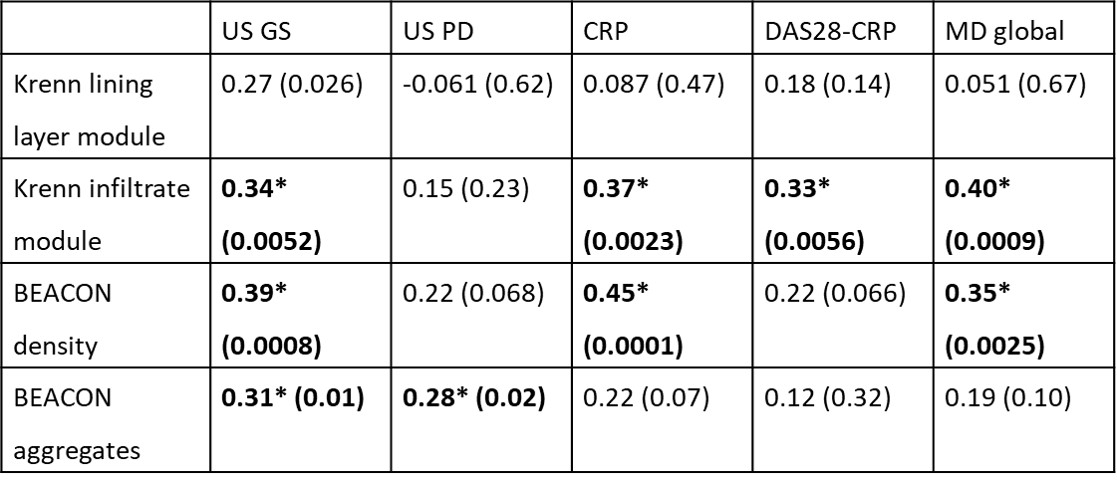Session Information
Session Type: Poster Session B
Session Time: 9:00AM-11:00AM
Background/Purpose: Evidence suggests that histological pathotypes are linked to pathogenic mechanisms in inflammatory arthritis and may be useful as biomarkers of outcome. The frequently used Krenn score was developed and validated to distinguish inflammatory from non-inflammatory synovitis using longstanding disease and does not distinguish the degree of histological organisation from the degree of infiltrate. We therefore developed discrete semi-quantitative indices of infiltrate density and aggregate size from which a simple pathotype grade could be derived in H&E stained tissue and examined their relationship with clinical and ultrasound variables in baseline synovial tissue biopsies from the BEACON early arthritis inception cohort.
Methods: Synovial tissue biopsies were obtained at baseline from unselected treatment naïve patients presenting to the Birmingham BEACON cohort with at least one clinically swollen joint. Final diagnosis was assigned after 18 months. 71 samples were analysed: RA (46), PsA (7), unclassified arthritis (8), and other inflammatory arthritis (10). Ultrasound (US) greyscale (GS) hypertrophy and Power Doppler (PD) were graded in joints prior to biopsy. 4 point semi-quantitative scales (0-3) were developed for discrete variables of cellular infiltrate density and aggregate size and number, with written definitions and an extensive image atlas. The BEACON density and aggregate scores were then used to create a summary pathotype: lymphoid (≥ grade 1 aggregates); diffuse (immune infiltrate in absence of aggregates); pauci-immune (absence of immune infiltrate). Following iterative assessments for face and construct validity, 3 independent scorers blindly graded 10 representative H&E sections using the atlas and the Krenn lining layer and infiltrate modules.
Results: Reliability of the BEACON scoring system was good (mean BEACON density ICC=0.69, BEACON aggregate Kappa=0.69, pathotype Kappa=0.72).
The BEACON density and aggregate scores correlated moderately with the Krenn lining layer module (r=0.48, p< 0.001 and r=0.43, p=< 0.001 respectively) and highly with the Krenn infiltrate module (r=0.92, p< 0.001; r=0.76, p< 0.001).
Table 1 shows correlation analysis for Krenn lining layer and infiltrate modules, BEACON density and aggregate scores vs US and clinical variables (CRP, DAS28-CRP, MD global score). The Krenn infiltrate module and BEACON density correlated with US GS, CRP, and MD global assessment; BEACON aggregate score correlated with US PD and GS. The Krenn infiltrate module alone correlated with DAS28-CRP. There were no correlations with the Krenn lining layer module.
There was a greater proportion of higher US GS grades in lymphoid than diffuse and pauci-immune pathotypes (Χ2(4, N=70)=11.18, p=0.025).
Conclusion: The BEACON scores and derived pathotype showed good inter-observer reliability and correlated significantly with US and clinical variables. Derived histological pathotype was also associated with US GS hypertrophy. This suggests that these variables have utility in describing infiltrate extent and complexity in early arthritis samples.
 Table 1: Spearman rank correlations of Krenn lining layer and infiltrate modules, BEACON density and aggregate scores with ultrasound and clinical variables. Spearman r (p value) *Significant after Benjamini Hochberg correction
Table 1: Spearman rank correlations of Krenn lining layer and infiltrate modules, BEACON density and aggregate scores with ultrasound and clinical variables. Spearman r (p value) *Significant after Benjamini Hochberg correction
To cite this abstract in AMA style:
Carr H, Sahbudin I, Maybury M, Dyke B, Turner J, Gullick N, Raza K, Scheel-Toellner D, Filer A. Development of a Tool to Assess Synovial Tissue Infiltrates and Derive Histological Pathotype in Inflammatory Arthritis: Relationship to Clinical and Ultrasound Variables [abstract]. Arthritis Rheumatol. 2020; 72 (suppl 10). https://acrabstracts.org/abstract/development-of-a-tool-to-assess-synovial-tissue-infiltrates-and-derive-histological-pathotype-in-inflammatory-arthritis-relationship-to-clinical-and-ultrasound-variables/. Accessed .« Back to ACR Convergence 2020
ACR Meeting Abstracts - https://acrabstracts.org/abstract/development-of-a-tool-to-assess-synovial-tissue-infiltrates-and-derive-histological-pathotype-in-inflammatory-arthritis-relationship-to-clinical-and-ultrasound-variables/
